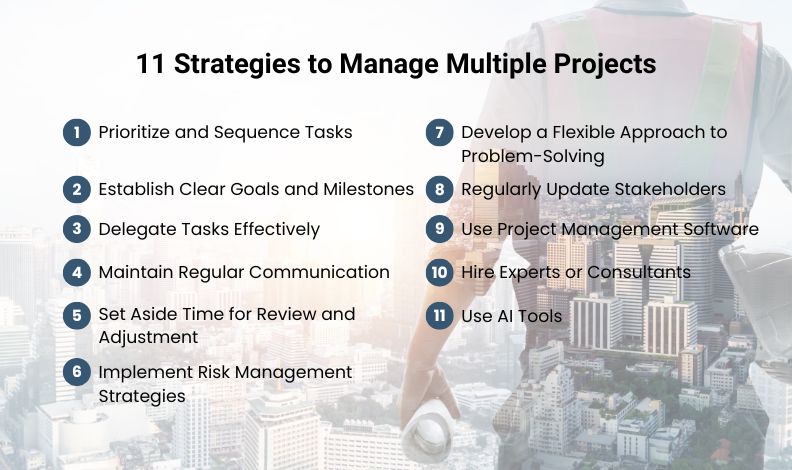Managing multiple projects could be very risky as it involves a large amount of resources and planning. However, in the current business world, project managers have no choice but to take multiple projects into their own hands to gain a competitive advantage and expand. Project managers must acknowledge that the secret to successfully handling various projects lies in planning and strategizing. Through this blog, we will offer you some expert tips and tools that can help you streamline multiple projects and achieve desired growth!
What Is Project Management?
Project management is the process of planning, organizing, and executing projects within time, value, and scope parameters to attain expected goals. It deals with project challenges by ensuring efficiency, effectiveness, and optimum resource utilization. Effective project management requires skills like communication, leadership, and problem-solving. However, it takes work to maintain these requirements while handling multiple projects. With so many things to focus on, multiple project management can pressure project managers, triggering them to commit frequent mistakes.
Common Challenges Managers Face When Managing Multiple Projects
While the rewards of a hit project management are masses, there are roadblocks you might come upon along the way:
- Conflict of Priority: When managing multiple projects, managers frequently face the challenge of efficiently prioritizing tasks. Each project has its goals, time limits, and stakeholders’ expectations, making it difficult to decide which task should take priority. This can result in delays, as excessive-precedence responsibilities from one task may battle with another. An incorrect prioritization can decrease performance and accelerate stress for the team, potentially inflicting essential duties to be left out or rushed.
- Overlapping Resources: Resource allocation is essential in multiple project management. Projects competing for equal resources, such as workforce, specialized equipment, or budget, can result in bottlenecks and delays. Overlapping resource needs can pressurize the workforce, reduce productivity, or even result in burnout. It can also impact the quality of work, as resources are constantly switched between tasks without sufficient focus on undertakings.
- Competing Deadlines: Multiple initiatives often include overlapping or conflicting time limits. This can stress the team’s ability to deliver great efforts simultaneously. It increases the risk of ignored deadlines and subpar overall performance. The pressure of competing timelines can cause blunders, reduce productivity, and lower morale of the workforce.
- Information Overload: Managing large amounts of data generated by multiple projects is very tough. The inflow of emails, updates, reviews, and files can overwhelm a project manager. It increases the chances of missing crucial information, miscommunication, and a lack of clarity regarding the project’s current status.
11 Strategies to Manage Multiple Projects

Using innovative strategies created with great expertise and technological tools can help you handle multiple projects without unnecessary mistakes. Here are 11 Strategies to help you manage more than one project efficiently:
1. Prioritize and Sequence Tasks
tart by identifying urgent tasks from each project and prioritize them for clarity. This guarantees that crucial tasks are finished on time, preventing bottlenecks. Consider using a prioritization technique like the Eisenhower Matrix to distinguish between urgent and critical responsibilities. By prioritizing correctly, you can maintain a consistent workflow and decrease the risk of project delays.
2. Establish Clear Goals and Milestones
Define measurable goals for every project and break them into viable milestones. These milestones act as checkpoints that help you tune progress and ensure you’re on the correct route. Clear goals provide direction and help maintain the team’s focus on the crucial part. You should also regularly evaluate these milestones to adjust plans and ensure each person is aligned with the task’s vision and expectations.
3. Delegate Tasks Effectively
Trying to manage multiple projects single-handedly can cause burnout. Instead, you should delegate responsibilities to your team members primarily based on their potential. Effective delegation frees up time to be aware of better-level duties and strategic planning. It also empowers your team members, boosting their confidence and productivity. Also, you should ensure that the delegated duties have clear instructions and deadlines to hold accountability.
4. Maintain Regular Communication
Open and consistent communication is essential for project completion. Keep stakeholders and team members informed about project progress, roadblocks, and plan modifications. Regular meetings, reviews, and updates assist in preserving transparency and fostering a collaborative environment. Effective communication guarantees everyone is on the same page and quickly copes with the gaps.
5. Set Aside Time for Review and Adjustment
Schedule meetings to evaluate project progress and identify potential challenges beforehand. These reviews can help you modify your plans and resources. They ensure the project stays on the right track and help you proactively handle any demanding situations before they escalate. This iterative review and adjustment method is vital to preserving project momentum and reaching preferred results.
6. Implement Risk Management Strategies
Identify potential risks derailing your project and create mitigation plans to address them proactively. Conduct a risk management session for each project to perceive vulnerabilities and make contingency plans. Regularly evaluate and update your change management strategies to account for new risks. By identifying and preparing for potential problems, you can minimize their impact and keep projects on track.
7. Develop a Flexible Approach to Problem-Solving
Challenges are an inseparable part of multiple project management. You should have a flexible approach to problematic situations. Embrace change and examine problems as possibilities for improvement. Being adaptable and open to new solutions allows you to navigate barriers and keep your projects moving successfully.
8. Regularly Update Stakeholders
Keep the stakeholders updated with the project’s current status. Transparency builds belief and allows one to avoid challenges down the road. Regular updates ensure stakeholders recognize any adjustments or challenges, allowing them to offer assistance and assets as needed. This ongoing communication fosters collaborative surroundings and allows for maintaining stakeholder engagement.
9. Use Project Management Software
Technological solutions like tools and software can be a great way to grow. Such platforms not only offer you automated scheduling and monitoring. It helps you control multiple capital projects without compromising the quality and project expectations. Project management software also gives you access to dashboards, making it easy to handle deadlines and look deeper into analytical insights. You can count on OnIndus to help you adopt such technologies and manage change effectively. We offer seamless transitions and growth opportunities.
10. Hire Experts or Consultants
If you struggle to manage multiple projects simultaneously, consider consulting experts like OnIndus. Our project management consulting services and a team of experts can provide you with valuable insights and boost project success. Our products like the OnIndus Dashboard Kit to manage project data and schedules and the AI-powered OnIndus Relay for real-time insights and automated reports. It can enhance collaboration so you can focus on core activities and manage multiple projects simultaneously.
11. Use AI Tools
AI is very beneficial in managing multiple projects; it can automate ordinary tasks, predict roadblocks, and offer real-time insights to optimize project execution. One such AI tool is OnIndus Relay; it’s an AI-driven chat platform that centralizes data, offers real-time insights, automates reports, and enhances collaboration and task tracking, making it an ideal tool for managing multiple projects efficiently.

Conclusion
Mastering the skill of managing multiple projects is crucial in today’s fast-paced business environment. By implementing the above-suggested strategies, leveraging the right tools, and maintaining a proactive mindset, you can overcome common challenges and drive your projects to success.
At OnIndus, we are committed to supporting your project management journey. Our innovative solutions, such as OnIndus Relay, OnIndus Dashboard Kit, and PMIS, empower you with real-time insights, automated reporting, and seamless collaboration. Connect with us to transform your project management approach and ensure your projects achieve the success they deserve. Let’s pave the way for your growth and efficiency together!
FAQs
1. Which is the best AI reporting tool to use in managing multiple capital projects?
One of the best AI reporting tools for managing multiple capital projects is OnIndus Relay. It offers real-time updates, enabling seamless tracking and management of various project metrics. This ensures timely decision-making and efficient resource allocation across all projects.
2. Who can help you manage multiple projects?
OnIndus is a team of professional consultants that can help you adopt innovative strategies and technological solutions to optimize your multiple project management. We offer you assessment, training, and support related to consultation management technology. Connect with us to optimize your project and gain success.
3. What’s the most challenging part of managing multiple projects simultaneously?
Many factors can contribute to the difficulty in managing multiple projects. Common challenges include cost overruns, managing manpower, schedule and performance management, prioritizing obligations, handling competing deadlines, and avoiding information overload.
4. What are strong project management skills?
Strong project management skills include effective communication, time management, problem-solving, and adaptation.

